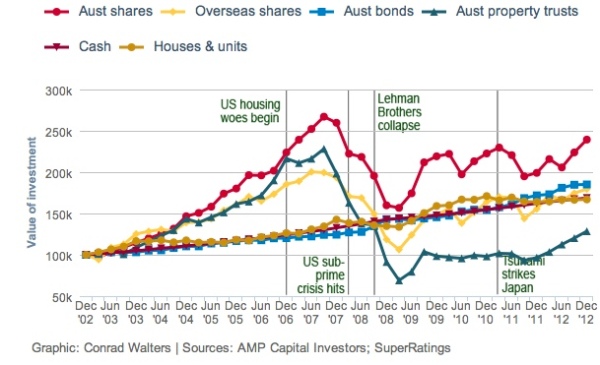 It was only 20 years ago that 44% of Australians retired before age 50. That’s right, nearly half of all Australians weren’t even 50 when they retired, and only a meagre 12% worked beyond age 60.
It was only 20 years ago that 44% of Australians retired before age 50. That’s right, nearly half of all Australians weren’t even 50 when they retired, and only a meagre 12% worked beyond age 60.
It was the done thing to leave school, get a job and stay in it for the next 30 years or so. True, people also generally lived shorter lives.
Today, huge improvements in health care and living standards means that people are living longer and are much healthier for most of their working lives. As a result, our generation spends more years working than any other in history.
With improved educational standards becoming the norm, let’s say an average Australian enters this phase of life at about age 20. The official retirement age today is 65 years. In another 10 years time, this age will be 67, and who know how much higher this age will be by the time most of today’s young Australians get there. This means there will be a good 45-plus years that an average Australian will spend in their working life before they can even start to consider receiving an age pension or accessing their superannuation.
That’s a lot of sinks to plumb, cars to sell, accounts to balance, children to teach and customers to serve, depending on your specialty.
In fact, it’s fair to say that younger Australians today are expected to work almost twice as long as previous generations. Couple this with job instability, low wages and meaningless work, and it’s no wonder an increasing number of people are disheartened by their work prospects and in some cases even suffering psychologically.
So what’s the solution? The government’s coiffures will be squeezed further by the increasing demands on the age pension – the baby boomers are about to head into retirement and are living longer – so don’t expect any good news from there. The price of tertiary education is also expected to increase, and let’s not even get started on price of houses these days.
Increasingly, you are going to need to depend on you. This means you’ll need to pay for your own education, earn a living and save for your own retirement. Hence, you’ll need to work longer. It can be overwhelming to realise that you could be stuck in that boring job until age 67 as you watch the ever-younger up-and-comers through your bifocals surpass you in status and possibly income. And it’s no wonder the movement to living frugally has taken off the way it has over the past few years as this new reality sinks in.
We live in an age where past career templates no longer apply. Nearly all of us know someone whose job has been made obsolete by technology or, increasingly, cheaper labour in an emerging economy.
While it may be tempting to just roll over and sleep some more, or tune into the latest TV reality show shot on the beach that is so unreal you wonder how it can even be called a reality show, you may be better off trying to understand the new normal so you have a better idea of what to do about it.
Here are three life principles more applicable to our time.
1. One career for life is old school
You may be lucky enough to know what you want to do from a young age and be happy doing that for life. For most of us though, boredom kicks in at some point and stays with us if we don’t take heed of its message. Any why wouldn’t you get bored spending over 40 years in the same career? Even the thought of it can be too much for some.
We are brought up to choose “one” career, not “a few” careers. I propose that we change our mindset to see that it is perfectly acceptable to change careers after a few good years – or even have a couple of different things on the go at the same time.
Interestingly, many of our youngsters these days have trouble choosing one thing only, so they don’t choose anything. See the problem? They can’t bear the thought of being pigeonholed so they opt out of choosing.
Variety is the spice of life, and who’d like to eat the same dinner every night for 40 years? The same should go for your career, so take the pressure off yourself and your kids to choose just one career.
Just start somewhere and know that it’s okay if it leads somewhere entirely different. It’s also okay to prefer more than one thing at a time. You can love the bar job because you get to mix with different people and at the same time you can restore old bikes because you love tinkering with engines. Hell, you may even find a way in future to show off the Harley in your new bar.
2. Study wisely
Parents and teachers have taught us that education is the cornerstone of a civilised and productive society. While this holds true to a point, maybe we need to update this assumption for today’s different circumstances.
For example, let’s look at what’s happening with lawyers in the United States today. For years, parents told their kids to study hard, get a good education and be a lawyer so they could earn a good income and get respect within society. So the kids did this. By the time they grew up, there was so much demand for further education in law that new law schools opened up. Now, there is a glut in young lawyers who can’t find paid work – and many more going through the system. They each owe about $US150,000 in tuition and end up working in department stories. Read it for yourself.
The biggest irony is that these young lawyers are considering suing their law schools because they are “fraudulently marketing the profession as a secure source of employment”. Truly! Worse, in a few years entry-level law jobs may also go to low-paying graduates from emerging economies who look to America for a better life (after an expensive bridging course).
I’ll bet some of those students wished they could go back in time and become a trader’s apprentice instead – they’d be running their own show by now without the overhang of a huge debt they may never be able to pay off.
Studying hard shouldn’t be underrated, but it doesn’t always pay off. The costs of tertiary education are increasing in Australia and jobs in some industries are diminishing. We need to rethink the practicalities of what we choose to study.
3. Passion = interest + time + application
A mantra of our time is to “find your passion”. This may be true for a few, but for most this is a destructive chorus. No wonder there are more people on psychiatric drugs than ever before.
How many of us really leap into this life with a screaming passion to achieve something that will earn us millions and leave us bursting with more energy with each passing day? Sometimes we are just lucky to survive a day filled with irate customers, whining children and barely enough money to pay our bills.
Sure, discovering your unique interests is a worthy pursuit, and I’d even venture to say it’s essential to a healthy psychological existence, but just don’t expect “finding your passion” to be the magic cure-all. Too many of us remain stuck because we mistakenly believe we haven’t yet discovered some latent passion that once released will open the golden door to all the love, happiness and money in the world.
So find your interests, spend time on them, and apply yourself. At worst, your interests will cost you some money, but at best your spirits will lift and you may develop a latent talent that could earn you millions. This is the path to igniting your passions.
It’s never too late
It’s easy to make excuses such as “I’m too old to change” or “I can’t afford it”, or even “The time is not right”.
I’m not suggesting you completely throw in the towel to your existing life, but you need to know that you are never too old. There’s a reasonable possibility that you’ll still be here beyond age 80, so starting afresh at 40 is not so bad.
So why not put these new life principles to work now?
 Really? So that Hermes Birkin bag at a bargain basement price of $7,000 was a worthy investment? You think it’s a symbol of wealth when in reality it’s more likely a symbol of financial mismanagement.
Really? So that Hermes Birkin bag at a bargain basement price of $7,000 was a worthy investment? You think it’s a symbol of wealth when in reality it’s more likely a symbol of financial mismanagement.



